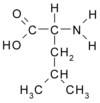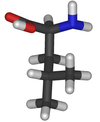Q: I keep reading about the importance of the amino acid leucine for bodybuilders. What is it, and why is it important?
A. Leucine's role as a bodybuilding supplement continues to grow. Along with valine and isoleucine, leucine is one of the branched-chain amino acids (BCAAs). BCAAs are unusual among amino acids in that they are used predominantly by muscle (most amino acids undergo heavy processing in the liver). Scientists have established that BCAAs produce energy during exercise, as well as promote protein synthesis. Recent research indicates even more the importance of leucine for both muscle growth and maintenance while dieting.
A recent review on the role of leucine points out that leucine and insulin appear to work together to promote protein synthesis in skeletal muscle. In addition, this same review noted that leucine taken alone after a workout is sufficient to "switch on" protein synthesis. Yet, although leucine alone is a potent activator of muscle growth, you still need the other essential amino acids to make those muscle proteins. Take five grams (g) of leucine with 20-40 g of whey protein and 50-100 g of carbs before and after your workouts. If you are on a low-carb regimen, you can nix the carbs and still reap added muscle growth.
Other research has pointed out the importance of leucine during dieting. To make a long story short, when calories are reduced, leucine in muscle is used to produce the amino acid alanine, which is used to produce glucose in the liver. It seems logical to hypothesize that high leucine intakes while dieting help spare protein and improve blood glucose control.
Of the commonly available dietary proteins, whey isolate and casein (milk) have the highest leucine contents (14% and 10%, respectively, of their total protein content). Whey isolate would be ideal for post workout intake, as it would move leucine to the muscles as quickly as possible. Even 10-15 g of whey protein would stimulate protein synthesis without increasing caloric intake too much. Casein (milk) protein would probably be ideal for other meals; its slower digestion rate tends to help keep dieters full. Some studies suggest that it exerts anticatabolic effects among those who are dieting. Strive to take in 10 g of leucine per day from food and supplementation.
COPYRIGHT 2003 Weider Publications
COPYRIGHT 2003 Gale Group



![Leucine Formula (Older Version [Note the diferences in the order of the elements in a molecule]) Leucine Formula (Older Version [Note the diferences in the order of the elements in a molecule])](pics/Leucine_3.png)
